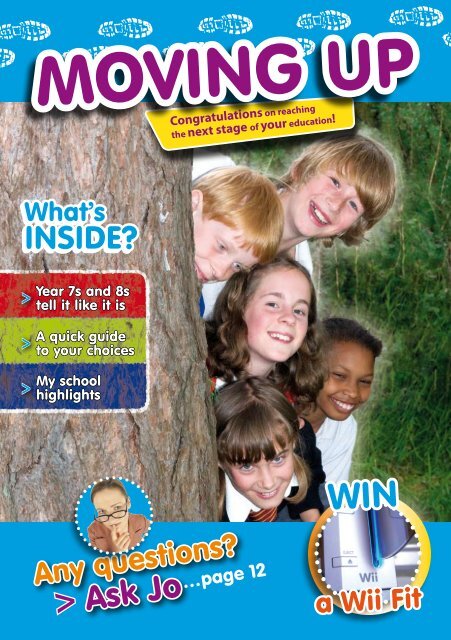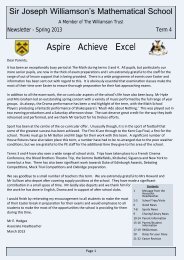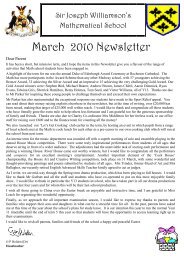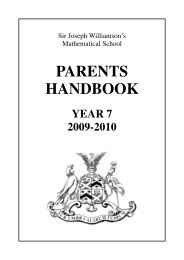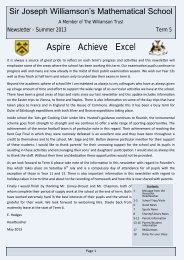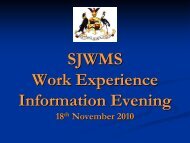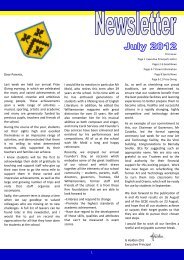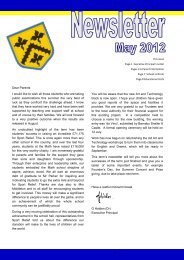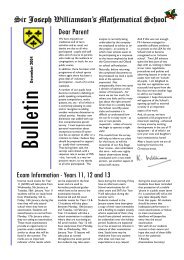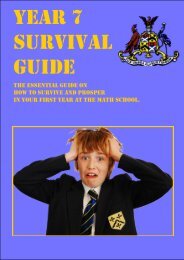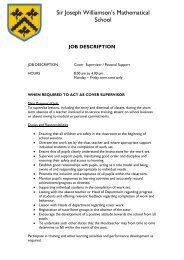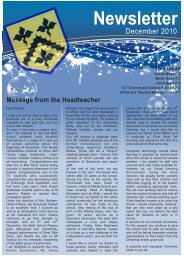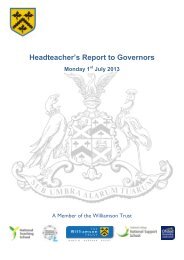DCSF 'Moving Up' - Toot Hill School
DCSF 'Moving Up' - Toot Hill School
DCSF 'Moving Up' - Toot Hill School
- No tags were found...
You also want an ePaper? Increase the reach of your titles
YUMPU automatically turns print PDFs into web optimized ePapers that Google loves.
MOVING UPCongratulations on reachingthe next stage of your education!What’sINSIDE?>>>Year 7s and 8stell it like it isA quick guideto your choicesMy schoolhighlightsAny questions?> Ask Jo…page 12WINa Wii Fit
WHAT’S INSIDE…Inside your copy of Moving Up you’ll find handy hints onmaking homework a breeze, tips from Year 7s about whatto expect when you get to school, and fun stuff – includinga chance to win a Wii Fit. Enjoy!Anything’spossible!page 6Looking aheadpage 4Insidescoop!Get the Big Picturepage 8page 16page 10PLUS…My Storypage14My school highlights8 Bigger and better! Your guide to the changes and choices coming up10 What’s it really like? A Year 7 and a Year 8 spill the beansWIN a Wii! Are you fit for secondary school? Try our easy-to-enter15 competition and win yourself a neat new NintendoSee www.direct.gov.uk/kids-moving for more advice about Moving Up.2
Congratulationson reaching the nextstage in your education!Secondary school may seem strange and a bit worryingat first, but don’t feel you’re the only one thinking that –everyone feels the same way when they start (they justshow it in different ways).You’ll be expected to be in school, thencollege or perhaps at work doing anapprenticeship (training while you work)until you’re 18. But that’s a long way offright now! The main thing is you’ve gota real adventure ahead of you.It’s an incredibly exciting time. You’llmake new friends for life. And theexperiences and the choices you makeover the next seven years will be just aslong-lasting.If you have an older brother or sister,you’ll know they can choose to leaveschool at 16. Most continue ineducation, because they know thatgives them the best chance to do ajob they really enjoy.Say goodbye to• Friends who are going to differentschools, but don’t be sad – you cankeep in touch• Your Year 6 teacher• Your classroom• Knowing everything about your school.You are the first year-groupto be able to choose from thefull range of learning options.So, whatever you want todo, there’ll be great choicesall the way and lots of newopportunities.Say hello to• New friends from other primary schools• Different teachers for different subjects.They know lots about their subject so askthem your trickiest questions• Lots of classrooms. You may have a differentclassroom for each lesson. You’ll carry yourbooks around with you so make sure youhave a bag!• Everything new and exciting. It takes a whileto get to know where your lessons are. Butdon’t worry – all Year 7s will feel the same.3
So muchchoice!How many times has one of your family or friends asked you‘What do YOU want to be when you grow up?’You may have an idea in your head. But you also know that there’sa world of opportunity out there. You might easily change yourmind when you find out where your talents lie and what you coulddo – if you really wanted.Anything’s possible, if you keep learning and working hard. Overthe next seven years you’ll find out a lot about different subjects,and about yourself.You may surprise yourself. DANIEL RADCLIFFE, who playsHarry Potter, was laughed at when he said he was going to bea famous actor. Look at him now. And DIANE ABBOTT thanksher English teacher for being the first teacher to really believein her and give her the confidence to go on to become aMember of Parliament.Appearances can be deceptive.None of his schoolmates wouldhave believed the youngHARRISON FORD, star of Kingdom of theCrystal Skull, would become a huge acting star.He was shy and awkward at school.?4
Be who YOUwant to be!It’s easy to label someone, based on how they look or what theyseem to be bad or best at. We even do it to ourselves. There areso many options open to you – which path will you take???If you want to get ahead get a hat!? ?Life can change in exciting ways if you KEEP ANOPEN MIND, WORK HARD and are AMBITIOUS.5
Put yourselfin the picture6
There’s so much going on at secondary school.How many sports and lessons can you see? How manyteachers? What are you most looking forward to trying?And wherewould YOUbe in thispicture?7
Year 7What to expectYou study lots of different subjectsincluding maths, English, science,geography, history, religious studies,foreign languages, ICT, art, music, designand technology, citizenship, and workon teamwork and problem-solving skills.Year 9What to expectYou study the same subjects, some ofthem for the last time. You have NationalCurriculum tests in English, maths and science.Decisions to makeWhich subjects to study in Years 10 & 11 orwhether to take a Diploma. Whichever optionyou choose, you still have to do English, maths,science, PE, religious studies, citizenship and ICT.8TimetableDiplomas are an excitingalternative to traditional subjects.There’ll be 17 to choose from by2011, including creative media,construction, engineering, IT,hair and beauty, business andfinance and many more.looking ahead…Year 8What to expectYou continue studying the same subjectsbut this time in a bit more detail.Sometimes you get the chance to studyother subjects or a new language.Decisions to makeHow to get better at subjects that needmore work.Year 10What to expectYou start your GCSEs or Diploma.Plus you’ll have the chance todo work experience to help youchoose your future career.Decisions to make1. Which areas of your workare you doing well at andwhich can be improved?2. How can you improve onyour weaker areas?3. Find out if you can do a tasterof courses you might want todo in years 12 and 13.
Year 11What to expectYou complete your GCSEs or Level 1 or 2Diploma. This means you have to workhard to do your best as you will be earningqualifications that will last for life.Decisions to make1. What you should do in Years 12 & 13.• A levels (people who do A levelsusually choose three or four subjectsto study in depth)• Diploma (Level 3 is equivalent toA levels and accepted by universities)• An apprenticeship or advancedapprenticeship where you train fora career by working with experts.You learn on the job and earn moneyas you train.2. Where to continue learning• In your (or another) school sixth form• In a college• In a workplace where theyprovide training.Then what?You could carry on learning at auniversity or college. Or you findwork in a job – maybe one that yourapprenticeship prepared you for?> University > Employment > Further EducationYear 12What to expectYou start your chosen course.Whatever you want to learn,there’ll be a place for you.Decisions to makeIf you do AS levels, you decidewhich subjects to continue to fullA level (A2). Do you want to do anExtended project?Year 13What to expectYou finish the course youstarted in Year 12.Decisions to makeYou decide if you want to carry onlearning at a university or a college– if you do you choose and applyfor a course. If you don’t want tostudy any more you choose thekind of jobs you want and applyfor work after Year 13.For more information on your learning choices,visit the award-winning website for young peoplewww.connexions-direct.com9
What’s it itREALLY like?Ellie (age 12) and Rueben (13) go to different secondaryschools, but they both agree on one thing – the schooldinners are better than you might think!Emily (age 11) and Abi (10) ask the questions…I’m worried about all the homework…E: They give you a diary telling you about all the work that term. Andthere’s a homework club. Some you can start whenever you’re ready.R: We get two pieces of homework a day. You get used to it.Are there any caring older kids at school?E: Some. Others just ignore you, but they aren’t nasty.R: They do look after you. It was a big change for me coming from a smallschool of 60 to more than 1,000.Any fun clubs I can join?E: Lots – drama, athletics, badminton and judo after school and at lunch time.R: Yeah, lots of after-school clubs – netball, football, things like that. But you canalso get help with homework.What are the punishments like?E: They still give detentions. You get kept in at lunch. You can get after-schoolones as well.R: You have to write it in a book that you’ve had detention.What are lessons like?E: Ours is a performing arts school, so there’s extra lessons like danceand drama.R: They’re a bit longer. You get different teachers for different subjectsand do special projects. I just did one on the Battle of Hastings.10
Loads more tests?E: Same amount.R: There are quite a few but you get loads of help to get ready for them.What are the dinners like?E: There’s a lot more choice. Or you can bring in a packed lunch.R: We’re inspired by Jamie Oliver, so there’s stuff like salad bars. It’s really good.Are the teachers stricter?E: About the same.R: Some of the teachers are, but they respect that you’re in Year 7 and don’tknow all the rules.Can you continue with your instrument?E: I don’t play one, so don’t know.R: You can, or you can learn a new one.Do people wear make-up and bring in their own shoes and stuff?E: Some in Year 10 or 11 go to college in the mornings and can wear whatthey like. Otherwise you have to wear uniform.R: You have to wear black shoes.Do you do different sports?E: Rugby, badminton, gymnastics.R: There’s more choice – you get to do stuff like javelinand shot-put.Is it hard to make friends?R: There are lots of people in the same situation asyou. They feel the same way as you. That makes iteasier to make friends.1330Number CruncherBefore you finish secondary school you could have:800042• 8,000 hours of lessons• 1,330 school dinners• Half a million minutes of teaching• 42 holidays.11
Ask Jo…your problems/worriesEven as adults, we get nervous and a bit stressed about big change – likemoving house, for example. It’s the same with moving from primary tosecondary school. Don’t worry if you have butterflies – everyone has,and they’re a good thing. You’d be a very cold fish if you didn’t!Here’s a few of the questions I get asked…Q Is it going to be all tests and homeworkat secondary? I didn’t enjoy my SATS.A Firstly, don’t worry about SATS. Yourteacher knows what you’re capable of,and their report will explain what you cando. Plus, your new school will see it as achallenge to improve your marks, with lotsof extra support if you have any difficulties.There’ll be some tests, but a lot morebesides. As for homework, it’s all aboutusing your time wisely. Just set aside sometime each day and you’ll be fine.Q I’m worried about me or my friendsbeing bullied at the school I’m going to.A Bullying isn’t as common as peoplethink. And it is taken very, very seriously byall schools. It’s not cool to put up with it ifyou’re being bullied or you see it happening.It doesn’t matter if it’s teasing, threats, anupsetting text message or just spreadingnasty rumours, report it to any teacherstraight away. Believe me, they’ll deal withit really quickly.Concerned about bullying?For more advice visit www.childline.org.uk812Q My brother says school gets really boring when you get older.A I bet one day he’ll look back on his schooldays as the best days of hislife. You’ll be too excited and exhausted to be bored. You’ll be learning somuch, in so many subjects, and having too much fun. Plus you will be thefirst group to experience the full range of opportunities that have beendeveloped – for instance you’ll be able to study any of the new Diplomasor go into a job with exciting training – so you’ll have really interestingoptions and definitely won’t be bored. I guarantee it!easy steps to making homework simple1. You’ll get a homeworktimetable. Keep it withyou and at home so youknow what subjectsyou have on what days,so your parent or carercan help you.2. When you areset homeworkwrite it in yourdaybook or diaryso you knowwhat it is.3. Make sure youknow when yourteacher wantsyour homeworkhanded in.4. Try to do yourhomework as soon asit’s set, when the classworkis fresh in yourmind. If you are busyafter school, plan whenyou can do it.
<strong>School</strong>Memories1. How old were you when you firststarted school?2. What subjects did you study atprimary school (the school youwent to before you were 11)?DO YOUR OWN SURVEY!Ask an adult – your mum perhaps,teacher, neighbour or granabout their schooldays.Here’s a few questions to getyou started:5. What was your favourite subject?6. Who was your best friend? Do you stillsee them?3. What did you like most about school?And what did you find difficult?7. What were your exams like?4. Did you study the following subjects,and if so how old were you when youstudied them?ScienceAny foreign languagesCookingSewingSportDesign & TechnologyReligious studiesDrama8. How old were you when youleft school?9. Did you leave school for a jobor to study?10. Do you wish you’d been able to studyfor longer or got training for a job?Did the person you spoke to havedifferent choices at school than you?What are the main differences?5. If it’s hard to workat home, try the locallibrary or schoollibrary, or go to ahomework club.6. Once you havefinished andhanded in yourhomework, markit as done in yourdaybook/diary.7. If you do research,don’t just print pagesoff the internet. Readweb pages and bookson the subject, makenotes on what you readand then write up whatyou understand.8. If your homework is tolearn something, read theinformation to yourself afew times. Then cover itup or close your eyes andtry to remember whatyou read.13
You are moving up, but you’ll takesome great memories with you.My StoryADE ADEPITANprofessional basketball playerProbably the most memorablemoment in primary schoolcame for me in my third yearwhilst learning to swim. Swimminghad become very frustrating, as mostof my class had learnt how to swim ina few months. I was in Year 5 and stillcouldn’t swim. Being an extremelycompetitive youngster, especiallyin all things sporting, I wasn’t veryhappy. I even started becomingafraid of the water because of theembarrassment of not being ableto swim a width.Each week, as someone differentwent to assembly to collect theirbadge, I really, for the first time in mylife, began to blame my disability.One of my teachers could graduallysee me become more and moredistressed about the situation andshe took it upon herself to designa float that I could tie onto my leg.Although I couldn’t kick, it helpedme with buoyancy.Within months I learned to swim awidth and can still remember goingup to collect my badge. It was thefirst time that I realised that, evenwith a disability, I could still achieveanything I wanted. With thanks tothe help of a very inventive teacher,it is one of my fondest memories.What’s your story? Turn to the back page toshare your favourite primary school memory.14Adapted from www.wheelchairchildren.org.uk/what/cases.html
Are you fitfor secondary school?Want to get in shape for your next school?Here are some top health tips to help you:WINa Wii FitTell us, in less than 50 words(or in pictures if you like)your best primary schoolmemory. The three that make ussmile the most will WIN a fantasticnew Nintendo Wii Fit. Email yourentry (only one per person) bySeptember 30, 2008 to…moving.up@dcsf.gsi.gov.ukGo to www.direct.gov.uk/kids-movingfor terms and conditions.Always eat breakfast before you startthe school day! It wakes your brain upand makes you do better in lessons.Fruit juice and a bowl of cereal make aquick and tasty breakfast.Eat at least five portions of fruit and/orvegetables every day.Don’t eat lots of sweets, chocolates orcrisps. These are high in sugar and fatand should only be a treat.If you live close enough to walk orcycle to school, it’s a great way to getexercise every day. Just make sure youare safe on the streets.Exercise at least three times a week for30 minutes or more. If you can exerciseevery day, that’s even better. Playingfootball with your friends or going fora cycle ride both count as exercise.Checklist for your first dayBag (you’ll have more stuff to carry)Pencil case (with a suitable writing pen)Reading bookLunch moneyBus pass if needed<strong>School</strong> PE/sports kitsHigh spirits!15
My <strong>School</strong>Highlights!What was your best time at primary school?My teacher is:Hayden: Our class won the choircompetition for the whole countyand we got to sing in the cathedralat Christmas. My mum and sistercame to watch and there werecandles and it was really cool.My favourite memory is:What I am most lookingforward to in secondaryschool is:Ella: I love science lessons andcan’t wait to get to secondaryschool as we’ll get to do lotsmore fun experiments there.Best friends’ signatures:My classroomassistant is:Emma: I learnt to play thesaxophone. I played in assemblyafter I’d passed Grade 2 and thatwas the best. Everyone said howgood I was. I am now learningGrade 3 and my teacher saysI can join an orchestra soon –maybe at secondary school.My favourite subject is:Reference: 00520-2008MAG-EN Title: Moving on up


